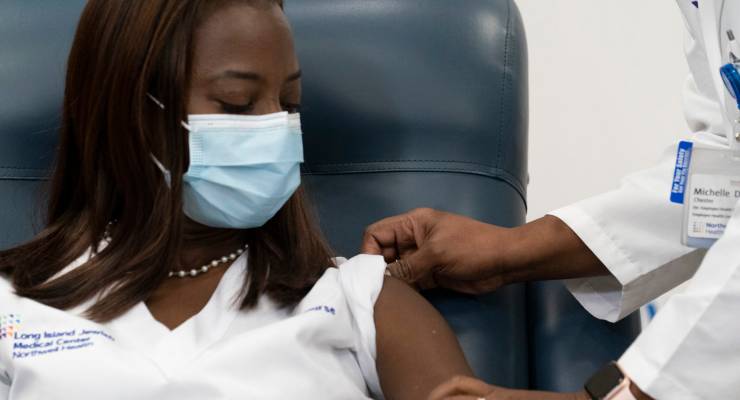
In Both Sides Now, author and ethicist Leslie Cannold presents two sides of an argument. Then it’s over to you: what do you think is true, and what do you think Cannold really believes?
Today: should doctors speak out about the government’s COVID-19 policies and handling of the pandemic?
No: doctors have an important job of carrying Australia through the pandemic — they should put their heads down and finish the job. Yes: if doctors are going to carry Australia, they need to be able to contribute to informed debate around the pandemic.
No
The Australian Medical Board has had enough. Earlier this week, it felt impelled to remind the doctors it regulates that not only are they expected to be vaccinated themselves, but that “any promotion of anti-vaccination statements or health advice which contradicts the best available scientific evidence or seeks to actively undermine the national immunisation campaign (including via social media) may … result in regulatory action”.
The Therapeutic Goods Administration also stepped in to remind health practitioners how the agency’s longstanding prohibitions on advertising impact on what can and can’t be said about COVID-19 vaccines.
This comes in the wake of declining vaccination rates in Australia that in 2019 saw five-year high rates of measles and an historically severe early flu season, alongside surprisingly high rates of vaccine refusal by health care workers in the UK and United States and the dizzying growth of the online anti-vaccination movement since the start of the pandemic.
Not surprisingly, doctors have been the ones to squawk about what many health practitioners consider a long-overdue shot across the bows of people without specialist expertise offering us the benefit of their opinion on TV and radio about the vaccine. On the ABC’s Health Report this week, for instance, GP and emergency physician Dr David Berger complained that the timing of such warnings was “sinister” and would cause doctors like him to “self-censor” to avoid “offending” the regulator.
Too bad. As universities have discovered, the willingness of some academics to comment on issues outside their expertise can cause public confusion and alarm, casting doubt on the credibility of the university and the profession overall.
This is the last fate we need to befall health practitioners in our anti-science age as public health officials work arm-in-arm with actual infectious diseases and public health experts to protect the populace against COVID-19.
What does this mean for health practitioners without relevant expertise when it comes to COVID-19? That their job in helping Australia return to more normal levels of economic activity and mental health is the same as the one assigned to the rest us: to stay up to date with the latest evidence so we can help educate those around us about the importance and safety of COVID-19 vaccines — and to keep our mouths shut and arm out when our chance to be vaccinated comes.
Yes
Well, that was scary. Since when did squelching informed debate at a time of medical crisis become a smart thing to do? Especially when that debate is taking place between experts about matters on which reasonable people can — and do — disagree.
Let’s be clear. The problem with the official “reminders” to medical professionals was not their content but the timing, and the way responses from both agencies to subsequent questions suggested a use of existing rules designed to manage one problem ––anti-vax health professionals — to shut down legitimate public debate.
The slow response of the regulator to anti-vax health professionals is a matter of public record.
But doctors like Berger, or the still-registered host of the Health Report Norman Swann, were never the target of the regulator’s evidence-based approach to vaccines. Far from being aligned with long-discredited theories about the connection between the MMR vaccine and autism, or the QAnon 5G tower please-don’t-make-me-understand-it-any-more-than-this crap, these doctors seek to air and contribute to discussions about legitimately contested areas of vaccine science and public policy.
What are the risks of blood clots from the AstraZeneca jab for women under 55? Why spend the time and money rolling out a vaccine that may not protect much, if at all, against variants of concern? Why did we use our limited supply of Pfizer vaccines in aged care facilities instead of on hotel quarantine and returning Australians, given that our non-existent level of community transmission makes them our only risk? Given the problem with supplies from overseas, and the rapid vaccination process taking place in many COVID-infested nations, shouldn’t we be setting up more plants at home to manufacture an updated vaccine effective against all variants, in the hope that this might allow us to open up?
If I were a were a more useful kind of doctor instead of a PhD, such questions could be risky for me to ask and verboten for me to answer if I didn’t want to risk — as most health professionals don’t — any interaction with the regulator.
No one is obliged to stick out their arm and accept medication into their body without asking questions. While health regulators have a responsibility to stop charlatans from making unfounded (and often conclusively disproven) claims about established vaccines because of the way such behaviour undermines trust in the profession, it is something else entirely to stop some doctors from providing public comment on new vaccines and immunisation policy that are uncertain and a legitimate source of public interest and debate.
This is even the case when a government may find it convenient to suggest there is no disagreement about its decisions and plans because criticism is annoying, and they want us all to be vaccinated.
Which side do you think Cannold sits on? And what do you believe? Send your thoughts to letters@crikey.com.au with Both Sides Now in the subject line.








“To help quell fears about the jab killing people, Dr. Steven Feagins, the public health director for the region, announced that side effects such as death are “actually way more common than you might think.”
This translates to a nearly 10 percent death rate among those vaccinated at Benedictine Sisters of St. Walburg.
I took the link out for moderation contraints.
It’s not clear what you’re getting at here, but this might add clarity:
https://factcheck.afp.com/kentucky-monastery-covid-19-cases-not-evidence-vaccine-problems
I am surprised you did n’t use Snopes. It would have been the same result. Factcheck just like Snopes is total propaganda and disinformation.There sole purpose it discredit the truth and preserve the official narrative.
Further to your “factcheck”…it looks like they don’t check their facts too well. They have exactly 50 corrections on their website where they have had to eat humble pie and apologize for their errors. I guess this is not bad considering they are a branch of the many active secretive intelligence agencies worldwide who’s remit is disinformation.
“Data released today by the CDC confirm several ongoing trends, including that 47% of deaths occurred in people who reported becoming sick within 48 hours of receiving a COVID vaccine, and 20% of deaths were cardiac-related.”
47% of the 0.000002% deaths are …
Let me stop you there.
Good luck trying to bring arithmetic to this – I cannot be arsed even reading these idiots so I’m glad that you can bear to do so and engage with them.
However futile your efforts may prove to be.
Hi Andy, why is it that when ever you post on this subject, it’s like talking to Pharmaceutical Company representative? Just an observation.
“”Good luck trying to bring arithmetic to this –””
Especially when you always cut and paste from the MSM….or believe the likes of “Snopes” or “factcheck”…what a joke you are fast becoming…!
Dear Atilla the Hun, is not one death one too many? It is true that the average age of those dying from the covid vaccine is around 70 years of age, but it also means there is a large percentage that are much younger. Some people are even saying that the side-effects from the vaccine is sot bad they would even prefer death. Carry on with your heartlessness and lack of compassion.
Agreed.
You remind me of that song by that Canadian band the Guess Who. No, not the World Health Organization you pharmaceutical dope. It’s called “Pain Train”..live at Paramount.
Bugger. I can see valid ideas in both arguments. Avoiding confusion and not giving anti-vaxxers ammunition is a fair aim. But limiting reasonable debate issues is unfair too. Is there a path down the middle here?
I am not an anti vaxer, but I am concerned at the mounting evidence about the possible dangers of the Astra Zenica vaccine. The cheapest, the one which according to rumour, politicians bought shares in.
If only we had a government that put its citizens ahead of their own grubby profit making. Alas, we do not have a government who cares about us.
I’m a fact seeker & with good reason I don’t trust offhand what is being parroted in the MSM. The Vaccinations are untried & potentially dangerous. How is it that a vaccine for the SARS-CoV-2 virus, which under normal conditions would take years to develop, was promptly launched in early November 2020? The mRNA vaccine announced by Pfizer is based on an experimental gene editing mRNA technology which has a bearing on the human genome.
Were the standard animal lab tests using mice or ferrets conducted?
Or did Pfizer “go straight to human “guinea pigs.”? Human tests began in late July and early August. “Three months is unheard of for testing a new vaccine. Several years is the norm.
So to be advocating that all is SAFE is a very dangerous statement. There is an obvious aggenda World Wide for this so called “Great Reset” and all the leaders are singing from the same script. Time to Question BUT they’re censoring everthing & if it doesn’t agree with Official diktat it’s removed ! This is serious folks -better start questioning everything before it’s too late. See these World leaders in this short 3.5 min Video :
https://www.youtube.com/watch?v=vQgF-5hqaSE
There are a Group of Australian Doctors who are trying to give Australians the answers re Covid-19.
We are a group of senior medical doctors and health professionals who are concerned about the health impacts of the lockdowns used in response to the SARS-CoV-2 outbreaks in Victoria and across Australia.
We are also concerned about the lack of good information available to the general public and the misleading use of data. These factors have created an unwarranted state of fear in our community.
We aim to detail the harms of the lockdowns, describe clearly the virulence and risks of the SARS-CoV-2 virus, critique aspects of the management policies and make this information readily available to the general public.
https://covidmedicalnetwork.com/